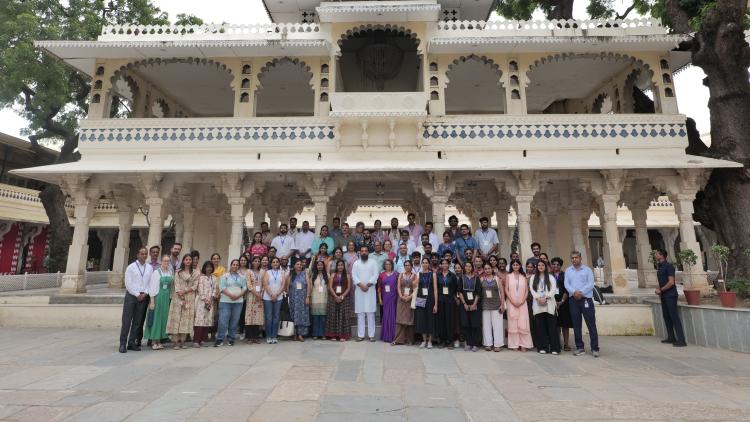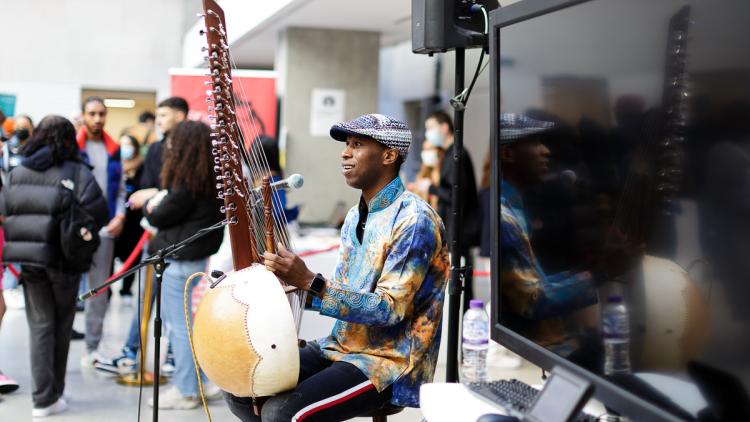Professor Lucy Durán

Key information
- Roles
- Department of Music Professor of Music Member Management Committee Member
- Department
- Department of Music
- Qualifications
- BMus, MMus (London), PhD (London)
- Building
- Russell Square: College Buildings
- Office
- 596
- Email address
- ld@soas.ac.uk
- Telephone number
- +44 (0)20 7898 4374
Biography
Lucy Durán (Professor of Music at SOAS, University of London) [of Spanish heritage] specializes in the music of Mali and Cuba. She completed her BMus and MMus at Kings College London University and obtained her PhD at SOAS, focusing on Mali’s women singers. She joined SOAS in 1993 where she established the first university courses in the UK on West African music, Cuban music and the kora. From 2000-2013 she presented the BBC Radio 3 weekly programme World Routes, making on-location features about traditional music in many countries including Madagascar, China (Xinjiang), Bolivia, Cuba, Senegal, Mali and Guinea Bissau.
Her research on Mande music of West Africa dates back to the late 1970s when she went to Gambia to study the kora with leading kora player Amadu Bansang Jobarteh. and from 1986 onwards she has been working intensively in southern Mali with some of its most prominent musical families. Her publications include pioneering work on Mali’s women singers, on the music of the Wasulu region, on possible connections between the ngoni and the blues, and on the kora.
In addition to her written publications, much of her output is practice-based. She has made several award-winning documentaries (e.g. the Growing into Music in Mali films that document how children in specialist musical families learn music through the oral tradition). As a music producer, she has 24 albums to her name, launching the solo careers of Toumani Diabaté, Bassekou Kouyaté and Trio Da Kali, all from Mali, with three Grammy nominations and many awards. Ballaké Sissoko’s international career was launched with her album New Ancient Strings featuring instrumental duets with Toumani Diabaté. She co-produced the award-winning album Ladilikan which features the unprecedented collaboration of the Kronos Quartet with Trio Da Kali.
Durán sees her approach to her production work as collaborative re-imagining of musical heritage. She is particularly concerned with traditions and repertoires in southern Mali that are under-represented, and/or endangered from globalization, jihadism, and rural exodus among other factors.
During 2015-16, with a grant from the British Academy Newton Advanced Fellowship, Durán supervised a multi-media project on Afromexican music from the Costa Chica, Oaxaca, Mexico resulting in a documentary film SOMOS NEGROS DE LA COSTA and an album, FORONTO - AFROAXACA, which she produced with local musicians and two of the members of Trio Da Kali in a mobile studio on a farm outside Llano Grande. The album was released in August 2019 and two tracks were co-opted by the Mexican government for the campaign to raise awareness of the 2020 census which for the first time included a category for Afromexicans to self-identify and be counted.
Her Tegere Tulon: handclapping songs of Mali (2018) co-directed by Malian filmmaker Moustapha Diallo (Macina Film) is a unique portrayal of the vibrant but endangered culture of girls’ handclapping songs of Mali, an enchanting tradition that is largely undocumented. It was nominated for ‘Best Short Documentary’ in the Cannes International Panafrican Festival, 2021. The film was commissioned for the Kronos Quartet's 50 For The Future educational project, featuring original compositions by the singer Hawa Kassémady Diabaté. The film and songs were premiered at the Kronos Quartet’s festival in San Francisco, 2019. Four more films by Durán and Diallo have emerged from this project, premiered in the Kronos Festival 2021.
Durán is also currently editing two new documentary films shot on location, both of which will be premiered in late 2022. One is about the enigmatic masked figure known as nama and its important relationship to sustaining agriculture and music in the Malian countryside. The other, commissioned by TV5Monde with support from the Aga Khan Foundation, is a film that follows Malian kora player Ballaké Sissoko from his home in Mali to revisit his roots in Casamance, southern Senegal, with stunning footage tracing the story of the kora.
Durán has recently also produced two albums recorded in Albania. TIRANA 100 - Tirana-Tirona AllStars was selected by Songlines magazine as one of ten 'Best Albums of 2021'. Another album, featuring music from Shkodra, is forthcoming.
Follow Lucy Durán on Instagram
Research interests
My research focuses primarily on music from/within the Mande cultural region and its diaspora, and is driven by my interest in promoting better understanding of and safeguarding oral traditions from the region. My outputs have therefore included radio documentaries (BBC Radio 3), film (Growing into Music in Mali) and CDs (various) released through the world music industry, as well as written outputs in both academic and non-academic journals. I am interested in the following topics with reference to the Mande world: gender and music; the role of women singers; songs as story and history; notions of musical mastery; weddings as a locus of performance and contestation; methods of oral transmission; creativity and music production in the recording studio; local forms of 'popular' music; conversations with the blues. In addition, I work on (and teach) the popular music of Cuba, and its ongoing connections across the Atlantic.
PhD Supervision
| Name | Title |
|---|---|
| James Anthony Gardner | The Course of the Hand: Formulas, Creativity and Processes of "Improvisation" in Mande Kora Music |
| Mr Hugo Hadji | Listening to New Raï: Algerian identities in the 21st century. |
| Crispin Robinson | Technicians of the Sacred: Generating transcendence in Afro-Cuban orisha worship. An ethnography of praxis in bata drumming. |
| Vicky Tadros | Listening, Khaleeji-Style |
Contact Lucy
- Telephone
- Social media

